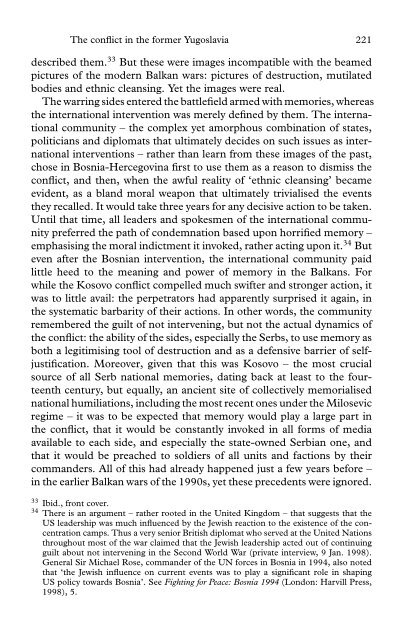Memory and Power in Post-War Europe: Studies in the Presence of ...
Memory and Power in Post-War Europe: Studies in the Presence of ...
Memory and Power in Post-War Europe: Studies in the Presence of ...
Create successful ePaper yourself
Turn your PDF publications into a flip-book with our unique Google optimized e-Paper software.
The conflict <strong>in</strong> <strong>the</strong> former Yugoslavia 221<br />
described <strong>the</strong>m. 33 But <strong>the</strong>se were images <strong>in</strong>compatible with <strong>the</strong> beamed<br />
pictures <strong>of</strong> <strong>the</strong> modern Balkan wars: pictures <strong>of</strong> destruction, mutilated<br />
bodies <strong>and</strong> ethnic cleans<strong>in</strong>g. Yet <strong>the</strong> images were real.<br />
The warr<strong>in</strong>g sides entered <strong>the</strong> battlefield armed with memories, whereas<br />
<strong>the</strong> <strong>in</strong>ternational <strong>in</strong>tervention was merely def<strong>in</strong>ed by <strong>the</strong>m. The <strong>in</strong>ternational<br />
community – <strong>the</strong> complex yet amorphous comb<strong>in</strong>ation <strong>of</strong> states,<br />
politicians <strong>and</strong> diplomats that ultimately decides on such issues as <strong>in</strong>ternational<br />
<strong>in</strong>terventions – ra<strong>the</strong>r than learn from <strong>the</strong>se images <strong>of</strong> <strong>the</strong> past,<br />
chose <strong>in</strong> Bosnia-Hercegov<strong>in</strong>a first to use <strong>the</strong>m as a reason to dismiss <strong>the</strong><br />
conflict, <strong>and</strong> <strong>the</strong>n, when <strong>the</strong> awful reality <strong>of</strong> ‘ethnic cleans<strong>in</strong>g’ became<br />
evident, as a bl<strong>and</strong> moral weapon that ultimately trivialised <strong>the</strong> events<br />
<strong>the</strong>y recalled. It would take three years for any decisive action to be taken.<br />
Until that time, all leaders <strong>and</strong> spokesmen <strong>of</strong> <strong>the</strong> <strong>in</strong>ternational community<br />
preferred <strong>the</strong> path <strong>of</strong> condemnation based upon horrified memory –<br />
emphasis<strong>in</strong>g <strong>the</strong> moral <strong>in</strong>dictment it <strong>in</strong>voked, ra<strong>the</strong>r act<strong>in</strong>g upon it. 34 But<br />
even after <strong>the</strong> Bosnian <strong>in</strong>tervention, <strong>the</strong> <strong>in</strong>ternational community paid<br />
little heed to <strong>the</strong> mean<strong>in</strong>g <strong>and</strong> power <strong>of</strong> memory <strong>in</strong> <strong>the</strong> Balkans. For<br />
while <strong>the</strong> Kosovo conflict compelled much swifter <strong>and</strong> stronger action, it<br />
was to little avail: <strong>the</strong> perpetrators had apparently surprised it aga<strong>in</strong>, <strong>in</strong><br />
<strong>the</strong> systematic barbarity <strong>of</strong> <strong>the</strong>ir actions. In o<strong>the</strong>r words, <strong>the</strong> community<br />
remembered <strong>the</strong> guilt <strong>of</strong> not <strong>in</strong>terven<strong>in</strong>g, but not <strong>the</strong> actual dynamics <strong>of</strong><br />
<strong>the</strong> conflict: <strong>the</strong> ability <strong>of</strong> <strong>the</strong> sides, especially <strong>the</strong> Serbs, to use memory as<br />
both a legitimis<strong>in</strong>g tool <strong>of</strong> destruction <strong>and</strong> as a defensive barrier <strong>of</strong> selfjustification.<br />
Moreover, given that this was Kosovo – <strong>the</strong> most crucial<br />
source <strong>of</strong> all Serb national memories, dat<strong>in</strong>g back at least to <strong>the</strong> fourteenth<br />
century, but equally, an ancient site <strong>of</strong> collectively memorialised<br />
national humiliations, <strong>in</strong>clud<strong>in</strong>g <strong>the</strong> most recent ones under <strong>the</strong> Milosevic<br />
regime – it was to be expected that memory would play a large part <strong>in</strong><br />
<strong>the</strong> conflict, that it would be constantly <strong>in</strong>voked <strong>in</strong> all forms <strong>of</strong> media<br />
available to each side, <strong>and</strong> especially <strong>the</strong> state-owned Serbian one, <strong>and</strong><br />
that it would be preached to soldiers <strong>of</strong> all units <strong>and</strong> factions by <strong>the</strong>ir<br />
comm<strong>and</strong>ers. All <strong>of</strong> this had already happened just a few years before –<br />
<strong>in</strong> <strong>the</strong> earlier Balkan wars <strong>of</strong> <strong>the</strong> 1990s, yet <strong>the</strong>se precedents were ignored.<br />
33 Ibid., front cover.<br />
34 There is an argument – ra<strong>the</strong>r rooted <strong>in</strong> <strong>the</strong> United K<strong>in</strong>gdom – that suggests that <strong>the</strong><br />
US leadership was much <strong>in</strong>fluenced by <strong>the</strong> Jewish reaction to <strong>the</strong> existence <strong>of</strong> <strong>the</strong> concentration<br />
camps. Thus a very senior British diplomat who served at <strong>the</strong> United Nations<br />
throughout most <strong>of</strong> <strong>the</strong> war claimed that <strong>the</strong> Jewish leadership acted out <strong>of</strong> cont<strong>in</strong>u<strong>in</strong>g<br />
guilt about not <strong>in</strong>terven<strong>in</strong>g <strong>in</strong> <strong>the</strong> Second World <strong>War</strong> (private <strong>in</strong>terview, 9 Jan. 1998).<br />
General Sir Michael Rose, comm<strong>and</strong>er <strong>of</strong> <strong>the</strong> UN forces <strong>in</strong> Bosnia <strong>in</strong> 1994, also noted<br />
that ‘<strong>the</strong> Jewish <strong>in</strong>fluence on current events was to play a significant role <strong>in</strong> shap<strong>in</strong>g<br />
US policy towards Bosnia’. See Fight<strong>in</strong>g for Peace: Bosnia 1994 (London: Harvill Press,<br />
1998), 5.
















